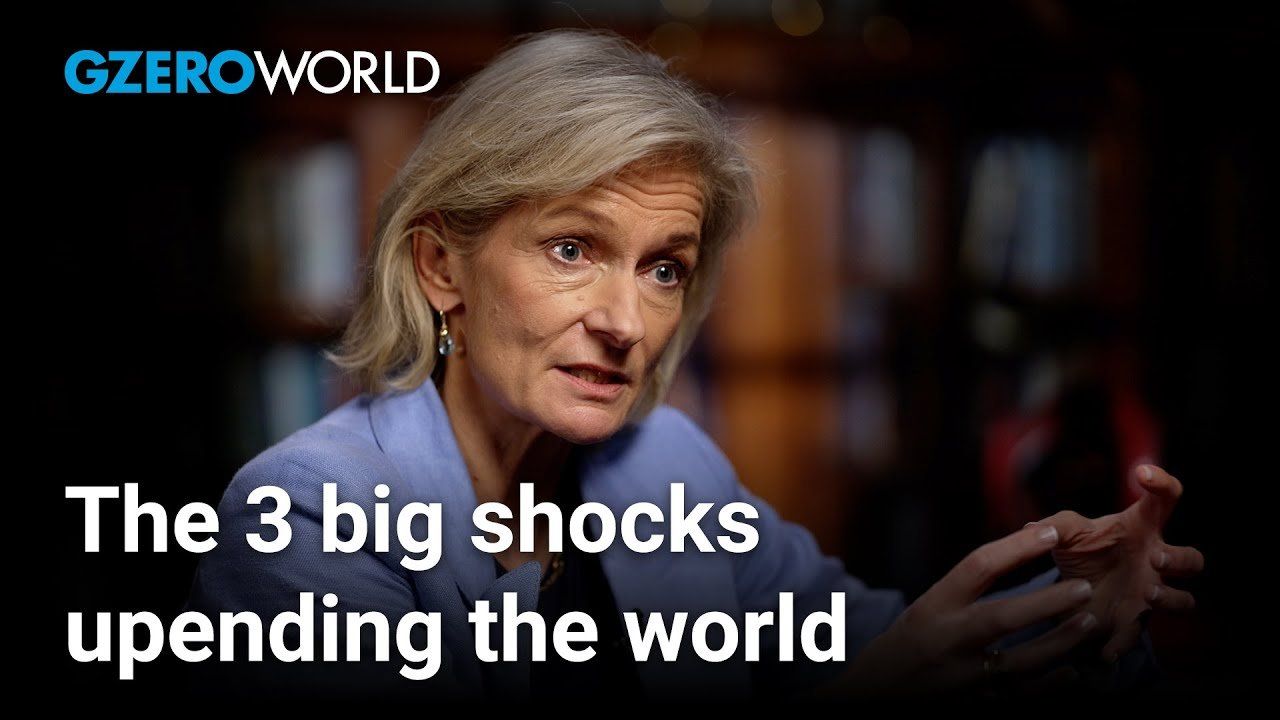March 26, 2025
According to The Economist editor-in-chief Zanny Minton Beddoes, 2025 is shaping to be a historic turning point defined by three massive global shocks. “Each of which is big enough for our grandchildren to have a chapter in their history books,” she warns on GZERO World with Ian Bremmer.
The first is geopolitical: the United States, once the architect of the global alliance system, is now actively challenging—and possibly undermining—it. The second is economic: the U.S. has abandoned free trade in favor of escalating tariff wars, threatening the global trading system that has defined the past 80 years. And the third, perhaps most transformative, is technological: the rapid rise of artificial intelligence, which is reshaping industries and economies faster than governments can respond. The combination of these three forces, Beddoes argues, creates massive uncertainty with the potential for severe damage.
While acknowledging that some aspects of the Trump administration’s policies—such as cutting bureaucracy and rationalizing government—may have merit, Beddoes is deeply concerned about its overall trajectory. “I just find the combination of this… bullying, transactional approach, where the view is that your gain must be my loss… fundamentally misguided,” she says. With global institutions struggling to keep pace with these shifts, the question is no longer whether the old order will survive—it’s whether the world can build a new one before chaos takes hold.
Watch full episode: Trump’s trade war: Who really wins?
GZERO World with Ian Bremmer, the award-winning weekly global affairs series, airs nationwide on US public television stations (check local listings).
New digital episodes of GZERO World are released every Monday on YouTube. Don't miss an episode: subscribe to GZERO's YouTube channel and turn on notifications (🔔).GZERO World with Ian Bremmer airs on US public television weekly - check local listings.
More For You
- YouTube
For many in Iran, it’s a waiting game for how long Ayatollah Khamenei has left to live.
Most Popular
An army soldier stands guard at a post at the Friendship Gate, following exchanges of fire between Pakistan and Afghanistan forces, at the border crossing between the two countries in Chaman, Pakistan February 27, 2026. Picture taken with a mobile phone.
REUTERS/Abdul Khaliq Achakzai
In a 30-minute call on Thursday, President Donald Trump reportedly told Ukrainian President Volodymyr Zelensky he wants to end the war with Russia as soon as possible — aiming for a deal by summer, but ideally within weeks.
Former British ambassador to the U.S. Peter Mandelson leaves his residence after he was released following his arrest by London police on Monday on suspicion of misconduct in public office, following the release of U.S. Justice Department files linked to the late financier and convicted sex offender Jeffrey Epstein, in London, Britain, February 26, 2026.
REUTERS/Toby Melville
The ghost of Jeffrey Epstein continues to haunt the world.
Think you know what's going on around the world? Here's your chance to prove it.
© 2025 GZERO Media. All Rights Reserved | A Eurasia Group media company.
